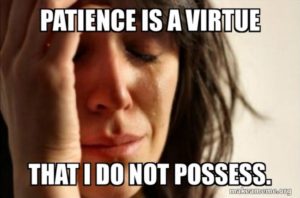Are you feeling frustrated with waiting for something in your life? Remember, 'patience is a virtue.' This post unpacks the meaning and origin of this proverbial expression.
Meaning
The proverbial expression 'patience is a virtue' means that patience is a skill worth learning and a valuable tool in life. It refers to the fact that patience is hard to acquire for most people and difficult to master. Therefore, by learning how to master your patience, you can expect a benefit in your life.
To have patience is to have resilience when waiting for something. As patience is virtuous, it's a state of moral excellence and something worth attaining in life. So, if 'patience is a virtue,' the frustration you feel at your lack of patience is a sign of your character and demeanor.
Example Usage
"I know you don't want to wait, but patience is a virtue. You need to go through everything in life to appreciate the outcome. Wishing for things to happen tomorrow will do nothing for you."
"Patience is a virtue. Just hang on for a few more months. When we land this contract, we'll never have to work again. The government assured me they're signing the power purchase agreement next week."
"The saying 'patience is a virtue obviously doesn't apply to people waiting for a delayed flight to take off to their destination."
"I know you want immediate gratification from this, but patience is a virtue. Just relax and let it play out as it should. There's nothing you can do to control things anyway."
"Whoever said 'patience is a virtue didn't have to stand in a line at 2 am in the morning just to get the latest Nike release."
"We just have to wait a little longer. Patience is a virtue. When it arrives, it will be worth the wait, I promise. Just sit tight and have some hot chocolate.'
"My parents told me 'patience is a virtue,' but they don't know what they're talking about. I want things now!"


Origin
The expression 'patience is a virtue' originates from the 3rd century. The term's first appearance is in 'The Distichs of Cato,' referred to as 'Cato to the Elder.' The phrase appears as the following.
"Of human virtues, patience is most great."
Other experts point to its origins in the 5th century, With the poem 'Psychomania,' written by Latin poet Prudentius.
Other experts attribute its origin to the legendary 'The Canterbury Tales,' written by Chaucer during the 14th century.
"Patience is a high virtue."
Language experts cannot pinpoint the exact origin of the phrase or who is responsible for coining the term. However, these three options are the most likely sources of the proverbial expression.
Phrases Similar to Patience is a Virtue
- Have patience.
- Worth the wait.
Phrases Opposite to Patience is a Virtue
- Immediate gratification.
What is the Correct Saying?
- Patience is a virtue.
Ways People May Say Patience is a Virtue Incorrectly
Saying patience is a virtue to people genuinely frustrated at waiting for something can upset them. It may seem like you have no empathy for their situations, or you don't understand what they're going through in their life.
Acceptable Ways to Phrase Patience is a Virtue
You can use the expression 'patience is a virtue' when speaking to people that seem impatient and frustrated. It's suitable for reminding people that good things come to those that wait. The expression 'patience is a virtue' applies to men and women, and it signifies that waiting for something is worth the reward it offers in the end.
You can use 'patience is a virtue' in professional and social settings. Use it at work to describe how waiting through your training is frustrating, but it pays off when you find a job. Use it at home when your kids are impatient for Santa's arrival on Christmas. Typically, people use this saying when confronting impatient people.